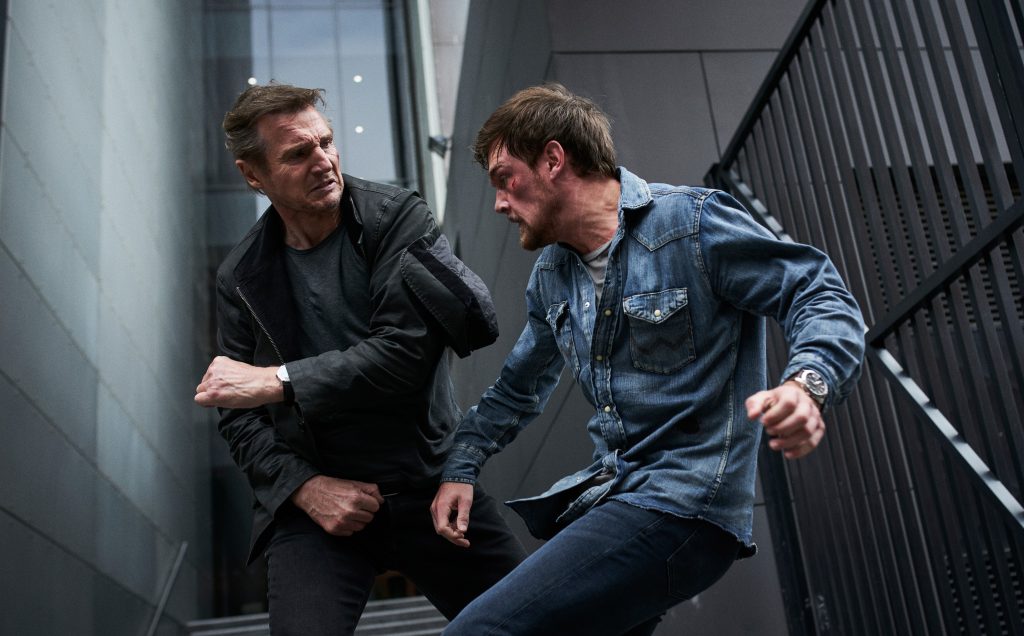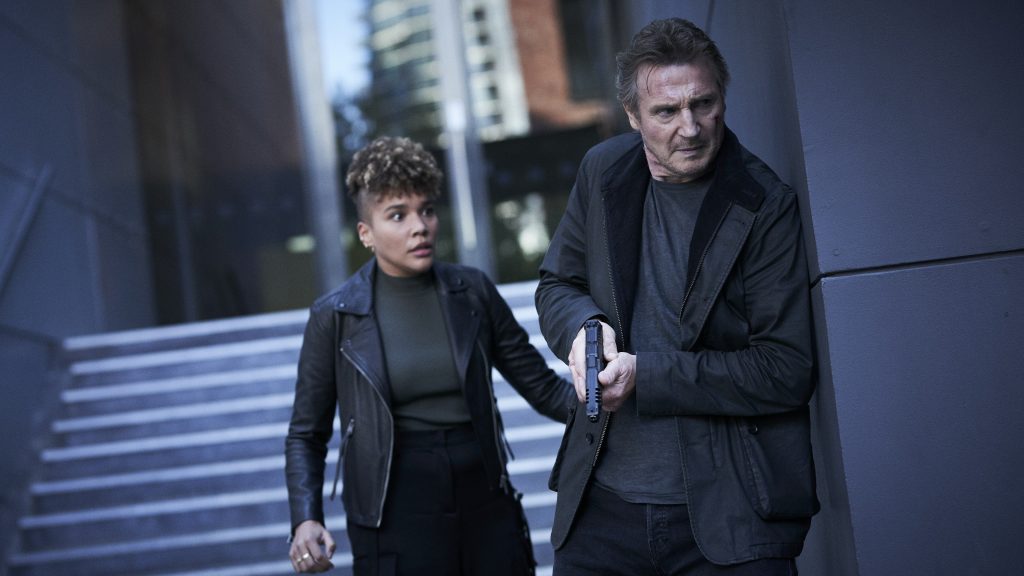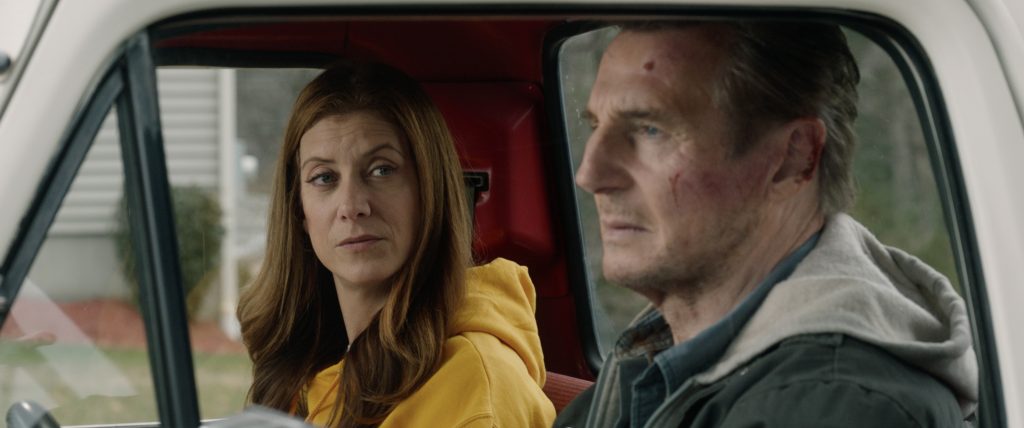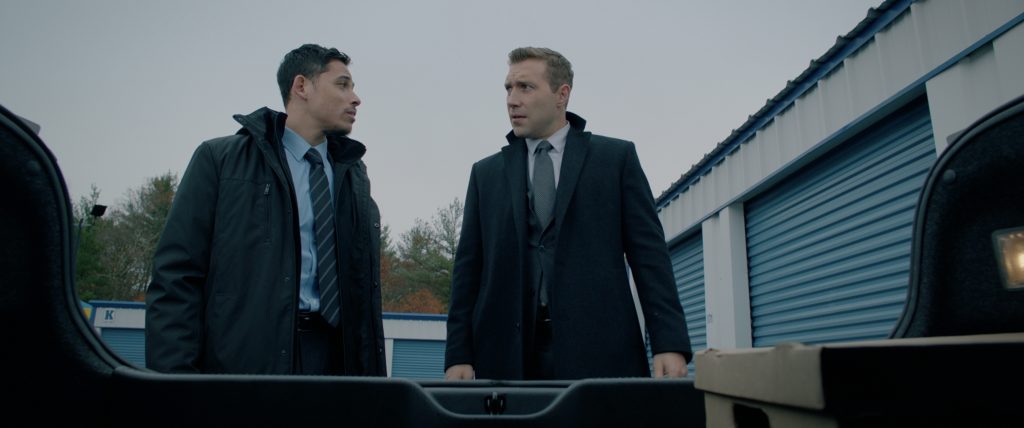February 12, 2022
by Carla Hay

Directed by Mark Williams
Culture Representation: Taking place primarily in Washington, D.C., the action film “Blacklight” features a predominantly white cast (with a few African Americans and Latinos) representing the working-class and middle-class.
Culture Clash: An undercover “fixer” for the FBI finds himself enmeshed in a corrupt conspiracy that endangers his life and the lives of others.
Culture Audience: “Blacklight” will appeal mainly to people who are fans of star Liam Neeson and ludicrous action movies.

Ever since the success of the “Taken” movie series, Liam Neeson has dragged himself down a shameless and shoddy hole of “Taken” ripoff movies. “Blacklight” is one of the worst. There is absolutely nothing original about this movie, which just re-uses and dumbs down plot elements from better action flicks, and then throws in lot of noisy stunts and fight scenes to distract from the ridiculous story. The movie has an awkward mix of gritty violence and ultra-sugary sentimentality. And through it all, Neeson looks like he’s just there for the easy money to play the same type of character over and over in these “Taken” ripoff movies.
“Blacklight” was directed by Mark Williams, who co-wrote the movie’s terrible screenplay with Nick May. Williams’ previous movie was 2020’s “Honest Thief,” which also starred Neeson as yet another grouchy loner with a troubled history and a bad temper. “Honest Thief” was another schlocky, unrealistic action flick, but at least “Honest Thief” tried to have some unexpected plot twists. “Blacklight” doesn’t even try. In fact, about 20 minutes into this 108-minute movie, it’s very easy to predict how everything is going to end.
In “Blacklight,” Neeson plays another “lone wolf” type with a particular set of skills in fighting whomever he fights in the movie. Neeson’s Travis Block character has been working “off the books” as an undercover “fixer” for the FBI. His boss is FBI director Gabriel Robinson (played by Aidan Quinn), who has one of the cheapest-looking and most basic offices that you’ll ever see in a movie for the supposed top leader of the FBI. He might as well be a back-office manager of a toilet-paper company with the type of office that he has in this movie. “Blacklight” is a fairly low-budget film, but the movie’s production design is laughably incompetent.
The story takes place mostly in Washington, D.C., but the movie was actually filmed in Australia. Regardless of where it was filmed, the low-quality cinematography often gives scenes a blue-gray tinge that makes locations look as soulless as a drab slab of steel. And for an action film, “Blacklight” has too many dull moments that aren’t helped by the movie’s subpar editing.
“Blacklight” opens with a political rally led by a progressive liberal politician named Sofia Flores (played by Mel Jarnson), who is obviously supposed to be like this movie’s version of Alexandria Ocasio-Cortez. In the audience of Sofia’s enthusiastic supporters is Dusty Crane (played by Taylor John Smith), who cheers his approval at everything Sofia says during the rally. Viewers find out later that Dusty is a former FBI agent who went rogue. Tragedy strikes after Sofia leaves the rally: She’s run over by a car, which speeds off.
Meanwhile, Travis is shown coming to the rescue of an undercover FBI agent named Helen Davidson (played by Yael Stone), who is trapped in a house trailer with an angry mob of about 10 to 15 white supremacists taunting her outside. Before Travis arrives, he finds out that Helen had been undercover to infiltrate this white supremacist group. However, Helen’s cover was blown, the mob outside knows she works for the FBI, and now these racists want to get violent revenge on Helen.
Travis does exactly what you think he would do to take on this furious mob that looks like it’s about to set the trailer on fire: He blows something up, and then runs off with Helen through a back door. And if people got killed during this massive explosion, oh well. “Blacklight” is so idiotic, it doesn’t bother explaining why Travis was sent all by himself for this dangerous rescue, when he was clearly outnumbered and had no backup in case things went wrong.
Back at FBI headquarters in Washington, D.C., Travis gives his boss Gabriel a briefing on what happened with this rescue. However, Gabriel has something bigger that’s preoccupying his thoughts: The death of Sofia is big news, and he wants to squash an investigation that could prove that her death was a planned murder. Sofia’s supporters are putting pressure on law enforcement to investigate her death as a homicide. Gabriel tells Travis that as far as he’s concerned, Sofia’s death was a hit-and-run accident, no matter what “politically correct protestors” want to say.
It’s at this point in the movie, Gabriel might as well wear a T-shirt that says, “Corrupt FBI Director Stuck in a Horrible Movie.” It’s also shown in the trailer for “Blacklight” that Gabriel is the movie’s chief villain. Later in the movie, it’s revealed that Travis and Gabriel did combat together during the Vietnam War. They lost touch with each other after the war. But then, 15 years ago, Gabriel contacted Travis out of the blue to offer him this undercover “fixer” job for the FBI. Travis has been a loyal employee ever since.
However, Travis wants to retire. Why? Because he wants to spend more time with his granddaughter Natalie (played by Gabriella Sengos), who’s about 5 or 6 years old and is a typical cute kid who says adorable things that make Travis feel all mushy inside. Natalie’s mother is Travis’ daughter Amanda Block (played by Claire van der Boom), who has been raising Natalie on her own, ever since Natalie’s father abandoned them. Amanda has abandonment issues because her mother (Travis’ ex-wife) also left the family when Amanda was a child.
The reasons for the collapse of Travis’ marriage remain vague in the movie. However, at one point, Travis remorsefully tells Amanda that he wasn’t a good husband and father, but he wants to make up for it by being the best grandfather he can be to Natalie. “Blacklight” has its sappiest moments when Travis tries to be an upstanding and reformed family man. But it all looks so phony when he does terrible and violent things that he knows are cover-ups for the FBI’s dirty deeds. Travis justifies it in his mind by saying he doesn’t believe in deliberately killing “innocent” people.
Meanwhile, at an unnamed newspaper that’s supposed to be as prominent as The Washington Post, ambitious reporter Mira Jones (played by Emmy Raver-Lampman) and her editor Drew Hawthorne (played by Tim Draxl) talk about the sudden death of Sofia. Mira, who calls Sofia a “voice of her generation,” thinks Sofia’s death could have been a political assassination, and Mira wants to investigate it for the newspaper. Sofia’s death has officially been ruled as an accident, and Drew believes this official report. He decides the official cause of death should be the story that the newspaper should have, so he declines Mira’s offer to investigate further.
Mira doesn’t know it yet, but her world will collide with Dusty and Travis. Dusty has bombshell information about the FBI that he wants to give to Mira. He’s in such turmoil about this information, he’s been drinking heavily and popping pills. That’s what he’s seen doing as he’s parked in his car outside of a police station. And he has an unconcealed, loaded gun next to him on the front passenger seat.
Some cops approach Dusty to ask him why he’s parked there. They see the loaded gun and ask Dusty to step out of the car to arrest him, since it’s illegal to have an unconcealed weapon in a car. Dusty resists arrest by suddenly assaulting the police officers. He’s outnumbered and easily arrested.
In jail, Dusty gets a visit from Travis, who wonders why Dusty could be so reckless and foolish. Travis is under orders from Gabriel to bail Dusty out of jail and bring Dusty into “special” FBI custody. Dusty tells Travis that he’s going to tell a reporter some information, and he’s not going to let anyone stop him. The information has to do with a secret government conspiracy called Operation Unity.
“Blacklight” is such a stupid movie that when Travis takes Dusty into custody in Travis’ car, Travis doesn’t handcuff both hands behind Dusty’s back. Instead, he has only one of Dusty’s hands handcuffed to a hook near a car window. And then, instead of locking Dusty up in a secure area, Travis takes a detour because he has a parent-teacher meeting at Natalie’s school. Travis leaves Dusty in his car unattended. And you know what that means.
Dusty escapes, of course, and that leads to a lengthy chase scene where Dusty steals a truck, and speeds down streets and on pedestrian sidewalks, thereby causing several car crashes and injuries. Travis races after Dusty in Travis’ car, and at one point their vehicles are side by side, with the windows open. Travis shouts at Dusty, “What the hell are you doing?” Dusty yells back, “I’m going to free my conscience!”
What’s the big rush, Dusty? It turns out that Dusty wants to meet with Mira, to give her the bombshell information that he has stored on a computer flash drive. That’s why Travis ends up meeting Mira too. But things don’t go smoothly for all three of them, of course. And not everyone makes it out alive by the end of the movie.
Dusty manages to escape from Travis and goes into hiding. Two FBI goons with the last names Lockhart (played by Andrew Shaw) and Wallace (played by Zac Lemons) are sent to go after Dusty. And the person who sent them is exactly who you expect it would be. The Washington, D.C. police department is also looking for Dusty since he’s now an outlaw who skipped bail. And, of course, Travis has to hunt down Dusty too.
“Blacklight” is such a sloppily made and terrible movie that it throws in a few things to try to make the characters look “deep and complicated,” but then does nothing with these subplots. For example, it’s revealed that Travis has obsessive compulsive disorder, but there’s barely any evidence of this OCD. The only person in Travis’ life to mention his OCD is Amanda, who tells Travis: “Your quirks aren’t quirks anymore. I sometimes wonder if your quirks changed you, or was it your dirty job?”
Mira has a backstory that’s introduced and then left to dangle as a meaningless plot strand. Travis and Mira end up reluctantly helping each other, because she’s been investigating Gabriel for ordering assassinations of political enemies and whistleblowers. (It’s another plot point that’s revealed in the movie’s trailer.) In fact, the “Blacklight” trailer gives away about 90% of the movie’s plot, including Natalie going missing, and Travis confronting Gabriel before their big showdown.
None of the acting is very impressive, although Raver-Lampman and van der Boom seem to be making an attempt to bring emotional nuance to their characters. Any effort to give a good performance is just wasted on a bad movie that has no intentions of being original in moronically staged and poorly written scenes in this inferior revenge flick. “Blacklight” is as suspenseful as wondering if Neeson is going to star in yet another “Taken” ripoff after making this garbage film.
Open Road Films and Briarcliff Entertainment released “Blacklight” in U.S. cinemas on February 11, 2022.


